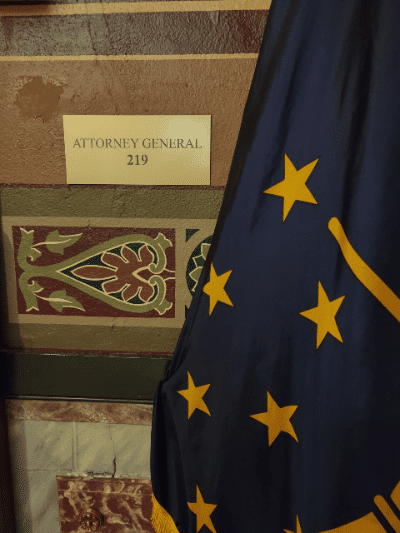
By Casey Smith
Indiana Capital Chronicle
June 21, 2023
The state attorney general’s office filed to appeal a superior court judge’s decision to grant class action certification to a lawsuit that seeks to strike down Indiana’s near-total abortion ban on the basis of the state’s controversial religious freedom law.
The legal challenge in question was certified as class action on June 6 by a Marion County Superior Court judge.
The underlying lawsuit was filed in August by the American Civil Liberties Union (ACLU) of Indiana on behalf of Hoosier Jews for Choice, as well as four anonymous women who represent a variety of faiths. The lawsuit argues that the new abortion law violates Indiana’s Religious Freedom Restoration Act (RFRA).
The class is defined as, “All persons in Indiana whose religious beliefs direct them to obtain abortions in situations prohibited by Senate Enrolled Act 1 (the abortion-restricting legislation) who need, or will need, to obtain an abortion and who are not, or will not be, able to obtain an abortion because of the Act.”
But attorneys with Indiana Attorney General Todd Rokita’s office maintained in a June 14 court filing that the trial court’s order granting class certification “introduces new uncertainty as to how the preliminary injunction would apply to class members both now and, should the injunction be affirmed, in the future.”
The state further questioned whether “the religious sincerity” of class members or “specifics of their religious practices” can be determined in a judicial setting.
“The trial court’s class certification order not only overlaps significantly with the preliminary injunction ruling in several key areas, but also relies on the preliminary injunction order to arrive at several key conclusions,” attorneys for the state said in their appeal request. “That interdependence, plus the trial court’s multiple legal errors and manifest abuse of discretion in certifying the class, justify immediate appeal and consideration alongside review of the preliminary injunction.”
The attorney general requested that the Indiana Court of Appeals accept an interlocutory appeal of class certification order.
Rokita’s office said, too, that the plaintiffs’ claims are not “ripe,” or timely, because they’re contingent on future pregnancies.
The state additionally held that claims made in the underlying lawsuit by the plaintiffs — which include practitioners of Judaism, Unitarian Universalism, Episcopalianism and paganism, all belief systems that allow abortions under circumstances outside the ban’s narrow exceptions — “fail on the merits” under RFRA.
An interlocutory appeal is requested when a final order has not been issued, but one of the parties seeks an appeal anyway because they stand to suffer damages if not resolved before the entire case is over. Alternatively, an interlocutory appeals can be requested because an order involves a substantial question of law — that if answered early on in the case — will help bring the overall case closer to a resolution.
The state must get permission from the trial court and the Indiana Court of Appeals to proceed with the interlocutory appeal. The Court of Appeals has not yet decided if it will grant the request, however.
Already, Rokita’s office filed an interlocutory appeal of a preliminary injunction granted in the case in December. State attorneys argued that plaintiffs “have not demonstrated that an injunction will prevent any certain RFRA violation.”
At issue in the preliminary injunction appeal is whether the trial court can make a RFRA determination “months and years before a woman decides to get an abortion, when sincerity cannot be tested until the relevant circumstances come to pass and whether obtaining an abortion is itself a religious exercise.”
That separate appeal of the preliminary injunction is set for oral argument in the Indiana Court of Appeals on Sept. 12.
In the meantime — while the appeals plays out — both parties in the case have requested for the underlying lawsuit to be stayed, or paused. The Marion County Superior Court granted that motion in a brief ruling on Wednesday.
This is the second case involving the ban. In January, Indiana Supreme Court justices heard a case against the ban based on liberty and privacy rights. They have not issued a ruling.
The new abortion ban was in effect for just a week in September before a Republican judge in Owen County issued a first temporary injunction in a separate ACLU lawsuit, which challenges the constitutionality of the law based on liberty and privacy protections.
The decision put the ban on hold while Indiana Supreme Court justices continue to weigh the case. Under that injunction, the state’s previous abortion law stands — allowing abortions up to 20 weeks.
The Republican-dominated Indiana General Assembly advanced the abortion-restricting measure during a heated, two-week special session that concluded in August. That made Indiana the first state in the nation to approve such legislation since the high court ruling that overturned Roe v. Wade.
The ban outlaws all abortions except in the case of a fatal fetal anomaly and cases of serious health risk to the mother. One part of the law says these exceptions are up to 20 weeks but another part says they can be used anytime. Rape survivors can get an abortion up to 10 weeks post-fertilization.
It also strips abortion clinics of their state medical licenses, and provides that only hospitals and hospital-owned ambulatory surgical centers can provide abortions.
Indiana Capital Chronicle is part of States Newsroom, a network of news bureaus supported by grants and a coalition of donors as a 501c(3) public charity. Indiana Capital Chronicle maintains editorial independence. Contact Editor Niki Kelly for questions: info@indianacapitalchronicle.com.